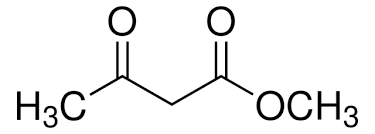Methyl Acetoacetate

Product Description
Methyl acetoacetate is a chemical compound with various industrial applications.
Product:
Methyl Acetoacetate
CAS:
105-45-3
Synonym:
Methyl 3-oxobutanoate; Acetoacetic acid methyl ester
Structure:

Typical Characteristics
Appearance
Clear, colorless liquid
Boiling point
169-171 °C
Density
1.078-1.080 g/cm3
Flash Point
77 °C
Melting point
-80 °C
Molecular Weight
116.12
Odor
Pleasant, fruity odor
Purity
99%
Refractive index
1.419
Uses, Applications & Markets
Key applications
get a quote
We Offer Methyl Acetoacetate
in various grades
A few of the grades available are listed below:



Methyl Acetoacetate used in many
industry applications
Methyl acetoacetate is a chemical compound with various industrial applications. Here are some of its uses:
- Chemical Intermediate: Methyl acetoacetate serves as a versatile intermediate in organic synthesis for the production of a wide range of compounds, including pharmaceuticals, agrochemicals, fragrances, and dyes.
- Resin Synthesis: It is used in the production of polymeric resins, such as polyurethanes and acrylics, as a reactive diluent or as a building block for the synthesis of resin monomers.
- Coating and Adhesive: Methyl acetoacetate is employed in coatings and adhesives formulations as a crosslinking agent or a modifier to improve adhesion, hardness, and chemical resistance of the final product.
- Plasticizer: It can be used as a plasticizer in polymer formulations to improve flexibility, impact resistance, and processability of plastics and elastomers.
- Flavor and Fragrance: Methyl acetoacetate is utilized in the flavor and fragrance industry as a building block for the synthesis of esters, ketones, and other aroma compounds used in perfumes, flavors, and cosmetic products.
- Photographic Chemical: It is used in the photographic industry as a chemical intermediate in the synthesis of photographic developers and other photosensitive compounds.
- Organic Synthesis: Methyl acetoacetate participates in a variety of organic reactions, including aldol condensation, Michael addition, and Claisen condensation, making it a valuable tool in organic synthesis.